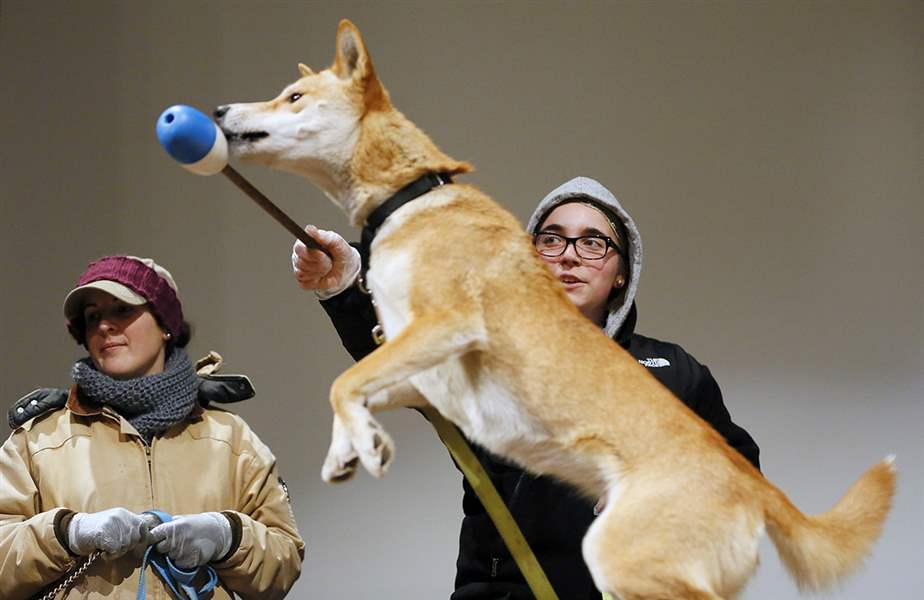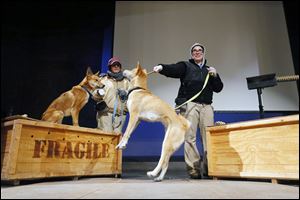
Dingoes jump into training at Toledo Zoo
Australian dogs will be in show for schools
1/30/2014
Zoo employee Tara Thompson, right, encourages Tawny, a 1-year-old dingo, to leap while training the animal for a new show that will be available for school groups. Stacy Burhart is at her left.
THE BLADE/AMY E. VOIGT
Buy This Image

Zoo employee Tara Thompson, right, encourages Tawny, a 1-year-old dingo, to leap while training the animal for a new show that will be available for school groups. Stacy Burhart is at her left.
The two Australian dingoes that came to the Toledo Zoo for last year’s Wild Walkabout exhibit have new jobs as part of the zoo’s educational programs.
The dingoes are featured in a new Science of Animals and Flight show available to school groups on weekdays in the auditorium at the Museum of Science.
The show is normally reserved only for schools that preregister, but a few public shows are scheduled in March and April.
Steve Oswanski, manager of the children’s zoo, said the zoo previously had conducted as many as five small shows a day for school groups of 25 to 30 children. Those shows typically involved two or three animals. “With this, we can lump our resources together and they get a bigger experience with more animals and more things happening,” Mr. Oswanski said, noting the larger shows are a more efficient use of staff time as well. “Everybody wins this way.”
The dingoes, a male and a female, had been used in the summer shows called Keeper Tales, but had not been trained to exhibit special behaviors. In the new show, the dingoes will show their prolific jumping skills by leaping to touch a target held by their keepers.
“The dingoes are wild dogs,” keeper Stacy Burhart said. “[The dingoes] do not seek you out for attention like your dog would at home. We can’t just get them to come up and get attention as a reward. It took us a while to find a treat that they would work for.”
That treat turned out to be dead mice.
Training the dingoes to handle the show has been a long process, as they are naturally wary creatures. It took four to five months to desensitize them to crowds, leashes, and crates to get them ready for Keeper Tales last summer.

Zoo employees Stacy Burhart, left, and Tara Thompson train 1-year-old Australian dingoes Indigo, left, and Tawny, who came to the Toledo Zoo originally as part of last year’s ‘Wild Walkabout’ exhibit.
“Anything new kind of blows their mind,” keeper Brian Kollar said. “Getting them to go through doorways was a really big step.”
If the staff adds something to the stage, the dingoes take time to get used to the new prop.
“We added a trash can on the stage and our female would not work for the session,” Mr. Oswanski said. “She had to take her time and slowly warm up to the trash can in order to just accept that it was going to stay still and just be there.”
While the animals quickly picked up a training technique called targeting, in which each dingo touches its nose to a target, it took about three months to teach them to jump to touch the target and get them ready for the new show.
A wallaby, a silky chicken, bats, a kookaburra, and a Harris hawk are also part of the program.
Andi Norman, director of public relations and marketing, said the program helps expose the animals to people and garner interest in them. “If they care about the animals, hopefully the next step is that they want to conserve them and conserve the spaces that their wild counterparts live in,” she said.
There is no fee for Science of Animals and Flight, but seating is limited and all school groups must register in advance by calling 419-385-5721, ext. 2042. Lucas County school groups receive free admission to the zoo; groups from other counties may call 419-385-5721 ext. 3122 for group admission rates.
Contact Alexandra Mester: amester@theblade.com, 419-724-6066, or on Twitter @AlexMesterBlade.